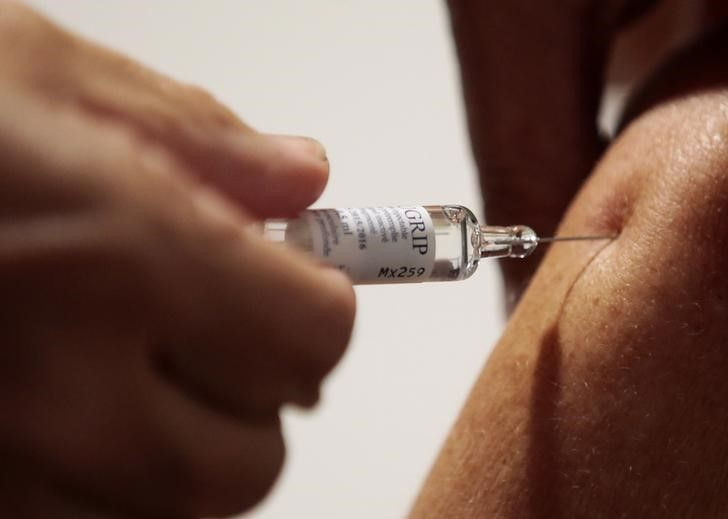Early Vaccination Tied To Fewer Flu Symptoms For Health Workers

(Reuters Health) - For health care providers, earlier influenza vaccination is linked to fewer flu symptoms and less time away from work, a Mexican study suggests.
"It’s a straightforward phenomenon: it takes three weeks for antibodies to develop, thus the earlier you get vaccinated the better," said senior study author Dr. Adrian Camacho-Ortiz, of the University Hospital Dr. Jose Eleuterio Gonzalez in Mexico.
"The most important finding of our study is that we provide proof of this phenomenon, which is scarce, moreover in health care providers," Camacho-Ortiz added by email. "We found that health care workers vaccinated earlier in the season had less influenza-like syndrome and were less likely to lose working days."
Camacho-Ortiz and colleagues analyzed data on nearly 6,200 health care workers over two flu seasons at one teaching hospital in Mexico.
During the first season, from September 2013 to April 2014, vaccines were given later than during the subsequent season, spanning 2014 to 2015.
Roughly 59 percent of the health care workers studied got vaccinated in each of the two flu seasons, the research team reported in the American Journal of Infection Control.
But during the first year of the study, only 23 percent of vaccinated workers were inoculated by the beginning of November, two months into the flu season. In the second year, 56 percent of the vaccinated workers were inoculated by November.
The difference may be due at least in part to earlier efforts to promote vaccination during the second season, the researchers note.
Fewer workers vaccinated early during the first year translated into more leaves of absence among the study participants – 52 the first year, compared with just 15 the following year – and more total days of lost work – 218 versus 68.
In the first year, 49 vaccinated workers experienced flu like symptoms, compared with just 24 the following year. There wasn’t a difference, however, in the proportion of vaccinated workers who had confirmed cases of influenza.
One limitation of the study is that the vaccine was known to be less effective during the second season. Contrary to the study results, the authors speculate that this should have increased the number of people with flu like symptoms and confirmed influenza cases during the second season.
Common misperceptions about vaccination, such as an incorrect belief that people can get influenza from the flu shot, may still lead some health care workers not to get inoculated, noted Sherri LaVela, a researcher at the Department of Veterans Affairs and the Feinberg School of Medicine at Northwestern University in Chicago.
"Many organizations that have instituted mandatory vaccination initiatives have seen large improvements in vaccination rates among health care workers," LaVela, who wasn’t involved in the study, said by email.
Beyond the lost work from delayed or skipped vaccinations, health care workers who aren’t protected against influenza can infect patients, noted Mary Lou Manning, president of the Association for Professionals in Infection Control and Epidemiology and a researcher at Thomas Jefferson University College of Nursing in Philadelphia.
"The scientific evidence is clear that the routine annual influenza vaccination of health care providers can reduce influenza-related illness and its potentially serious consequences among the providers and their patients," Manning, who wasn’t involved in the study, said by email. "There is also evidence to suggest that when hospital workers get vaccinated, community flu rates decline."
SOURCE: http://bit.ly/1Revajq American Journal of Infection Control, online November 13, 2015.
Published by Medicaldaily.com



























